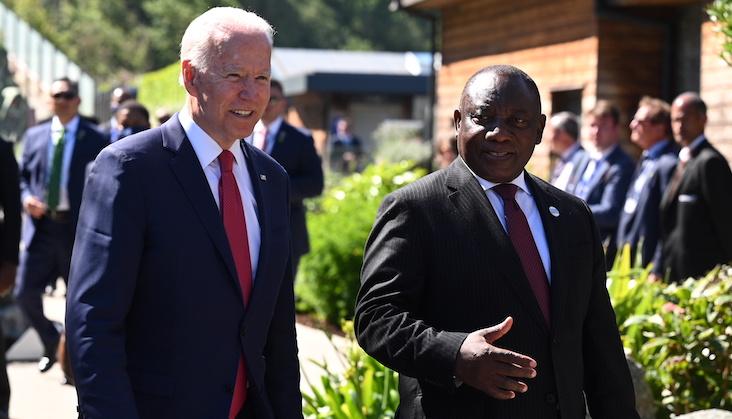Africa-Press – Lesotho. The new US administration is looking to turn the page on Donald Trump’s disdainful attitude to Africa even as it doubles down on the former president’s signature African initiative this week at the first US-Africa gathering in the Joe Biden era.
Political and business leaders from across the continent will be mingling virtually with their US counterparts from Tuesday 27 July to Thursday 29 July at the US-Africa Business Summit organised by the Corporate Council on Africa. The theme for this year’s event is ‘New Pathways to a Stronger US-Africa Economic Partnership’.
The online gathering is a chance for US officials to elaborate on what Biden promised in his February address to the African Union: that this would be a partnership rooted in “mutual respect” in tackling global challenges from the Covid-19 epidemic to climate change. Largely unmentioned, but never far from mind, is the goal of countering growing Chinese influence on the continent.
Top US officials slated to address the event include Gina Raimondo (Commerce Secretary); Katherine Tai (US Trade Representative); Linda Thomas-Greenfield (US Ambassador to the UN), Samantha Power (US Agency for International Development (USAID) Administrator); John Kerry (special climate envoy) and Dana Banks (National Security Council senior director for Africa).
The US made a decision very early on, when these countries were becoming independent, that the main policy of the US would be economic development. African dignitaries on the agenda include Congolese President and African Union Chairman Felix Tshisekedi; Presidents Uhuru Kenyatta of Kenya, Paul Kagame of Rwanda, Filipe Nyusi of Mozambique and Mokgweetsi Masisi of Botswana; Prime Minister Pravind Jugnauth of Mauritius as well as World Trade Organisation Director General Ngozi Okonjo-Iweala of Nigeria.
“We’re really excited because this US-Africa Business Summit is really the start of talking about this administration’s commitment to rebuilding our relationship and strengthening our economic partnership with the continent,” a senior administration official tells The Africa Report.
“We’re committed to turn the crisis into opportunity, turn peril into possibility.
The president talks a lot about building back better at home, but we also want to work around the world to build back better abroad. ” 500 deals across 45 African countries
To get there, the administration is expected to announce at the summit that it is asking Congress for more resources for Prosper Africa, a Trump administration initiative that was launched at the last US-Africa Business Summit in Mozambique in 2019 (USAID is asking for $80m to administer the program in its FY 2022 budget request).
The initiative, which mobilises 17 US agencies and departments to help identify and facilitate trade and investment opportunities, has been credited with helping close to 500 deals across 45 African countries for an estimated total value of $47bn over the past two years.
The economic relationship could definitely use the help. In 2019, Africa accounted for just 1.4% of the US trade and 0.7% of US foreign direct investment, according to the Congressional Research Service.
“That’s what the reimagined Prosper Africa initiative is all about – it’s about leveraging the power of the private sector to mobilise investment and drive economic growth,” the senior administration official says.
“What this administration is seeking to do and our priorities where it relates to Africa is, we’re seeking an Africa that is more connected and capable and will be better able to cooperate with the United States to address global challenges and advance shared values and interests.
”
Florizelle Liser, the president and CEO of the Corporate Council on Africa, tells The Africa Report that some 1,500 people have registered to attend the virtual event as of Sunday 25 July, just 300 shy of the 1,800 who attended in person in 2019.
In a clear sign of where the Biden administration’s focus lies, she says officials across the administration have been clamouring to participate in Tuesday’s session.
“The joke is, every week there was another agency that said, well, we need to be a part of that,” Liser adds.
“Now that panel must have eight speakers from eight different agencies, because no agency wanted to be left out in terms of talking about what they’re doing to support US-Africa trade and investment.
”
‘A national reckoning on race’
That focus on building on the previous administration’s initiative isn’t surprising, says Herman Cohen, a former assistant secretary of State for African affairs under President George H.
W Bush, who is slated to speak at the summit. “The US made a decision very early on when these countries were becoming independent that the main policy of the US would be economic development,” Cohen says.
“Our policy has been very consistent. But of course, how you approach that policy varied over the years. ”
One such variation that’s expected to be outlined by the Biden administration is increased attention to minority-owned businesses in the United States after the killing of an unarmed black man – by a white police officer in Minneapolis in May 2020 – which sparked a national reckoning on race.
“You may hear, for example, that they may have a little bit more of a focus on SMEs (small and medium enterprises), and on women, and diaspora-owned businesses.
You may not have heard a lot of that in the last administration,” Liser says. “In these days of post-George Floyd, there is a sense of, how do you help minority-owned businesses here in the US to get a bigger piece of the American pie.
To me, it makes a lot of sense that some of those small, minority and diaspora-owned businesses here have a natural linkage to small businesses in Africa. I think we’ll hear more about that under this administration. Because I think it’s the right thing to do and the right time to do it,” she adds.
For More News And Analysis About Lesotho Follow Africa-Press






